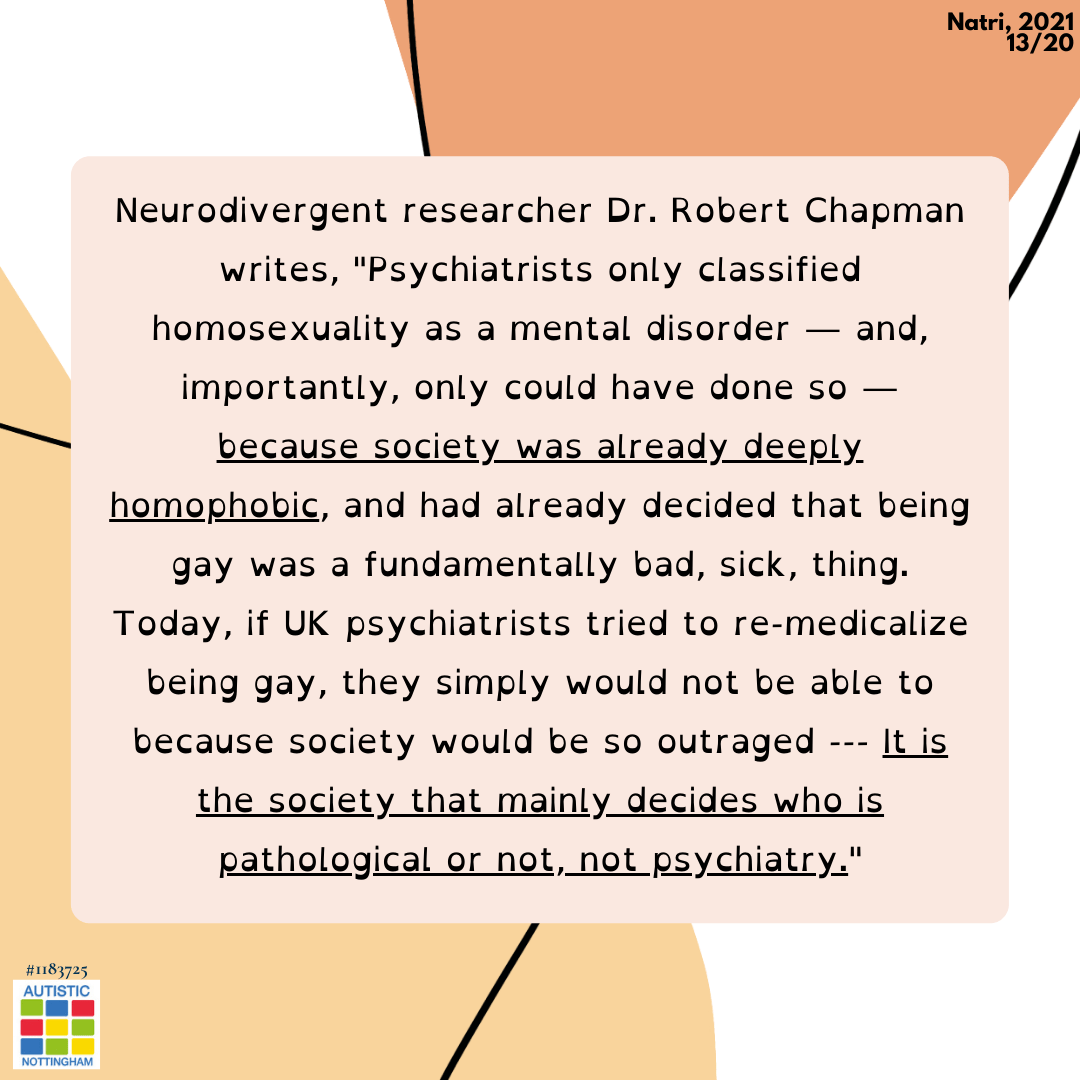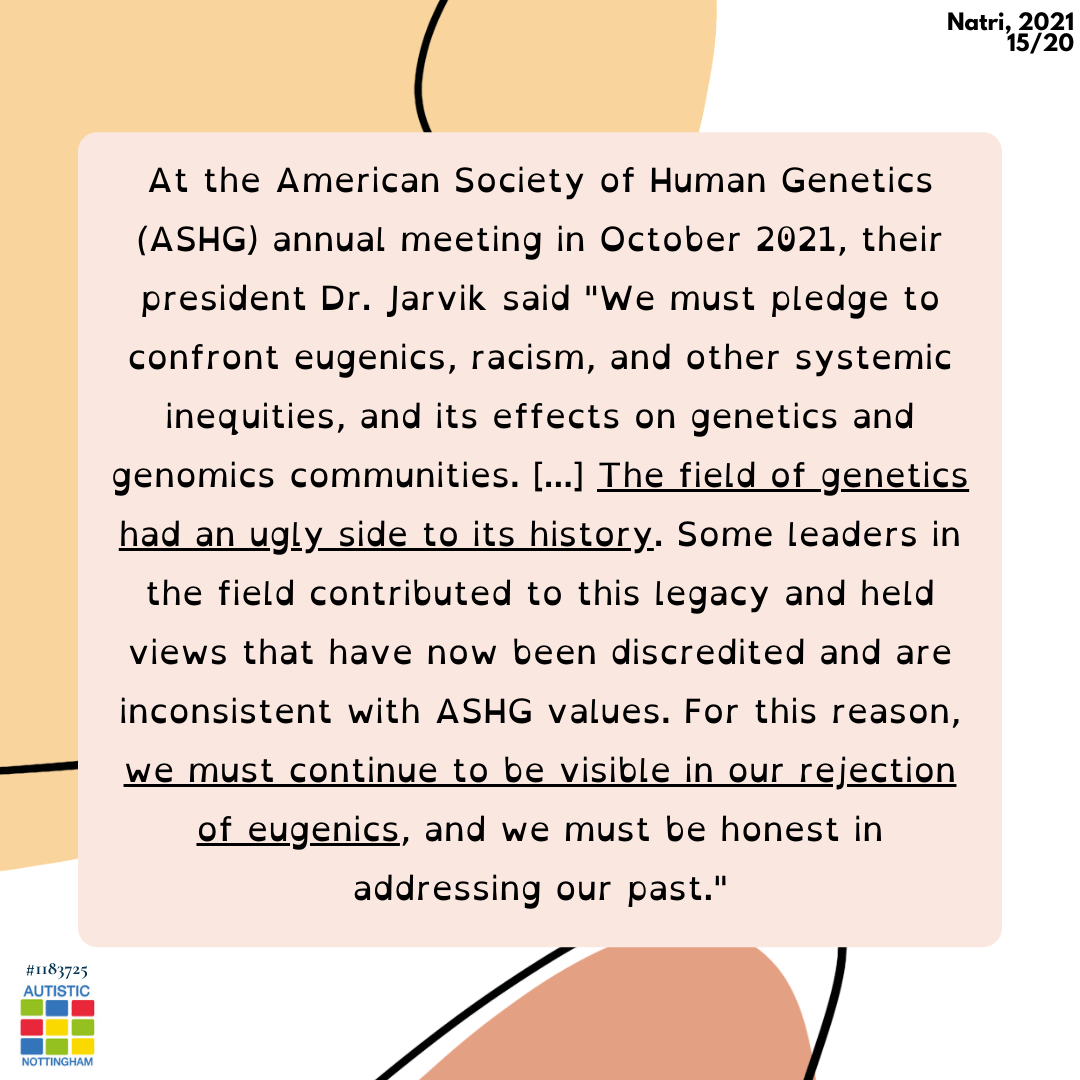
Natri, 2021
1/20
AccessibleAcademia
Nothing about us without us
Who: Natri
Where: The Translational Genomics Research Institute
Published: 2021
Title: Spectrum 10K and The Questionable Past, Present, and Future of Genetic Autism Research
Spectrum 10K:
The matter is urgent.
The time to act is now.

Natri, 2021
2/20
In September 2021, the Spectrum 10K genomics project was paused in response to ethics concerns from the autistic community. It is now under review.
This paper overviews the failures which led to this project being paused, and underlines the importance of transparency & integrity.

Natri, 2021
3/20
Spectrum 10K was announced in August 2021 in the UK. It was led by the University of Cambridge, the Wellcome Sanger Institute, and the University of California Los Angeles and funded by the Wellcome Trust.
It aimed to recruit 10,000 autistic people “to investigate the genetic and environmental factors that contribute to autism and related physical and mental health conditions to better understand wellbeing in autistic people and their families.”

Natri, 2021
4/20
It was paused due to ethical concerns raised by the autistic community after only 3 weeks. This might be the first time a large-scale project has been paused due to the ethical concerns raised by members of the marginalised community targeted by the research.
The concerns voiced by autistic advocates include lack of transparency in recruitment and engagement, consent issues, the suitability of the principal and co-investigators, and the possibility that the data and results could be used towards eugenics.

Natri, 2021
5/20
While Spectrum 10K is not currently answering questions or openly engaging with the autistic community, they have promised to consult with the community & to include 15-20 autistic people & some parents/carer in co-designing this consultation. Many people see this as insufficient.

Natri, 2021
6/20
While historically autism has been considered as a disease or disorder, new evidence shows that autistic people experience and interact with the world in a way which is different to neurotypical people, but which is not inherently deficient.
Autistic advocates & researchers aim to move away from a deficit model and towards a better understanding, social inclusion, and accommodation of autistic peoples needs.
However, many researchers & clinicians still view autism through a deficit lens, pathologizing autistic communication style, body language, rationality, and other autistic traits.

Natri, 2021
7/20
Spectrum 10K is led by Simon Baron-Cohen (psychologist) & Daniel Geschwind (Geneticist), both of whom have been criticised for their stigmatising stances.
Baron-Cohen popularised the idea that autistic people are “mind-blind”.
Geschwind was previously associated with a nonprofit called Cure Autism Now. He said in an interview “If you’re interested, even in a more abstract way, in human behaviour and human cognition, autism is an extraordinary window into that — It involves dysfunction in social cognition, language ― the things that are really part of what makes us human.”

Natri, 2021
8/20
Baron-Cohen responded to the eugenics fears about Spectrum 10K, saying “Genetics of autism is complex; we may be talking about hundreds or thousands of genes — You could never diagnose autism prenatally, and that’s because, even if we knew the biology, diagnosis rests on behaviour. That’s only possible to observe postnatally.” This was published without critical examination.

Natri, 2021
9/20
Spectrum 10K specifies developing “well-powered polygenic scores to integrate genetic data into diagnosis” as one of the main goals of the project. By developing polygenic risk scores (PRSs), Spectrum 10K is quite literally developing a genetic test for autism. PRSs are already used in preimplantation genetic testing and embryo selection, no diagnosis other than a risk score is needed.
Once this information is published, anyone can use it for prenatal testing & embryo screening. It is likely that eventually autism risk scores will be used for embryo selection, no matter how inaccurate the underlying models may be.

Natri, 2021
10/20
Spectrum 10K refused to acknowledge that the most likely use of this data will be to prevent the birth of autistic babies. This is eugenics via polygenic embryo selection.
What this means is that an embryo could be tested during pregnancy to see if it has a genetic marker which indicates that the child may be autistic. The pregnant individual could then chose to terminate the pregnancy on the basis that they may have an autistic child.
Definitions from Oxford Languages:
Eugenics
Noun
the study of how to arrange reproduction within a human population to increase the occurrence of heritable characteristics regarded as desirable. Developed largely by Sir Francis Galton as a method of improving the human race, eugenics was increasingly discredited as unscientific and racially biased during the 20th century, especially after the adoption of its doctrines by the Nazis in order to justify their treatment of Jews, disabled people, and other minority groups.

Natri, 2021
11/20
There are important parallels between autism and the pathologization of sexual orientation and gender identity: Researchers have warned against the development of prenatal genetic tests for sexual orientation at least since the 90s, and these concerns remain relevant.
There have been recent attempts to map sexuality to genetics, and this has been widely condemned. LGBTQIA+ researchers highlight how the risks of such research outweigh any possible benefits.

Natri, 2021
12/20
In many ways, the neurodiversity movement is where the gay rights movement was some decades ago. “Gay gene” studies have become less popular because homosexuality is no longer deemed pathological by society, and the public response to these studies is overwhelmingly negative.
Clinicians & researchers only pathologize differences which have already been stigmatized or deemed pathological by society.

Natri, 2021
13/20
Neurodivergent researcher Dr. Robert Chapman writes, “Psychiatrists only classified homosexuality as a mental disorder — and, importantly, only could have done so — because society was already deeply homophobic, and had already decided that being gay was a fundamentally bad, sick, thing. Today, if UK psychiatrists tried to re-medicalize being gay, they simply would not be able to because society would be so outraged — It is the society that mainly decides who is pathological or not, not psychiatry.”

Natri, 2021
14/20
Homosexuality was removed from the Diagnostic and Statistical Manual (DSM) of Mental Disorders in 1973 and gender identity disorder in 2013, changing their status from pathology to normal variation and validating LGBTQIA+ identities.
Cognitive & social communication diversity is still described using a disease label. This strengthens stigma & can be used to justify mistreatment & to deny autonomy.
While better understanding the diversity in neurology and cognition is important, we must acknowledge that as long as some traits and differences are stigmatized, developing tools like PRSs for those traits paves the road for eugenics.

Natri, 2021
15/20
At the American Society of Human Genetics (ASHG) annual meeting in October 2021, their president Dr. Jarvik said “We must pledge to confront eugenics, racism, and other systemic inequities, and its effects on genetics and genomics communities. […] The field of genetics had an ugly side to its history. Some leaders in the field contributed to this legacy and held views that have now been discredited and are inconsistent with ASHG values. For this reason, we must continue to be visible in our rejection of eugenics, and we must be honest in addressing our past.”

Natri, 2021
16/20
It is essential to take into account the existing threat of eugenics, the problematic past of genetics research and their current practices, and the responsibility to protect vulnerable populations.
It is crucial that research on vulnerable groups is led by members of that group: we must ensure that autistic people are represented at all levels of autism research and that the goals and approaches align with the needs of autistic people.

Natri, 2021
17/20
Genetic research can contribute to the prejudice surrounding neurological differences such as autism, and geneticists are producing data which can and will be used for eugenics. The field must take immediate action to protect vulnerable groups from this existential threat.

Natri, 2021
18/20
ASHG has created guidelines and published statements that underline the importance of ethical engagement.
Studies like Spectrum 10K must commit to transparency in their recruitment and be honest about the real possibility that research findings can be used for embryo screening.
For example, it is essential that participants are able to give informed consent. If the benefits of the research are overstated and the risks minimised, they cannot make an informed decision about their participation.

Natri, 2021
19/20
Recently published guidelines for genetic and genomic research with marginalized groups and indigenous peoples have outlined principles to guide engagement, emphasizing the importance of justice, respect, transparency, integrity, equity, reciprocity, and care for the individual and community. Building trust through transparency and integrity requires increased accountability and clear regulations.
Spectrum 10K is a cautionary tale on a complete failure in large-scale genomics on a vulnerable population.

Natri, 2021
20/20
Members of marginalized populations must be adequately included at every stage of this process and not merely tokenized. Scientific journals, funding bodies, and academic institutions must create and enforce rules and regulations to hold the field accountable, and researchers must commit to integrity, transparency, and ethical conduct.
As the tools for polygenic embryo selection already exist, the matter is urgent.
The time to act is now.

Leave a Reply